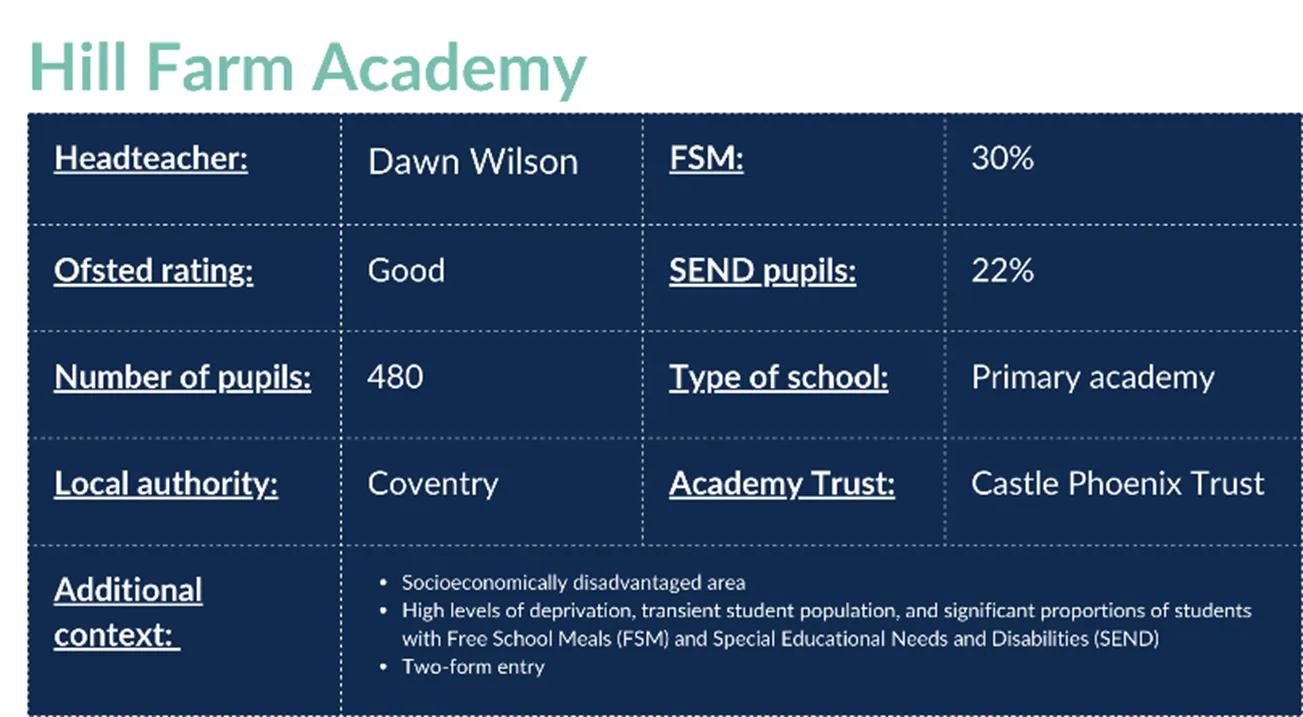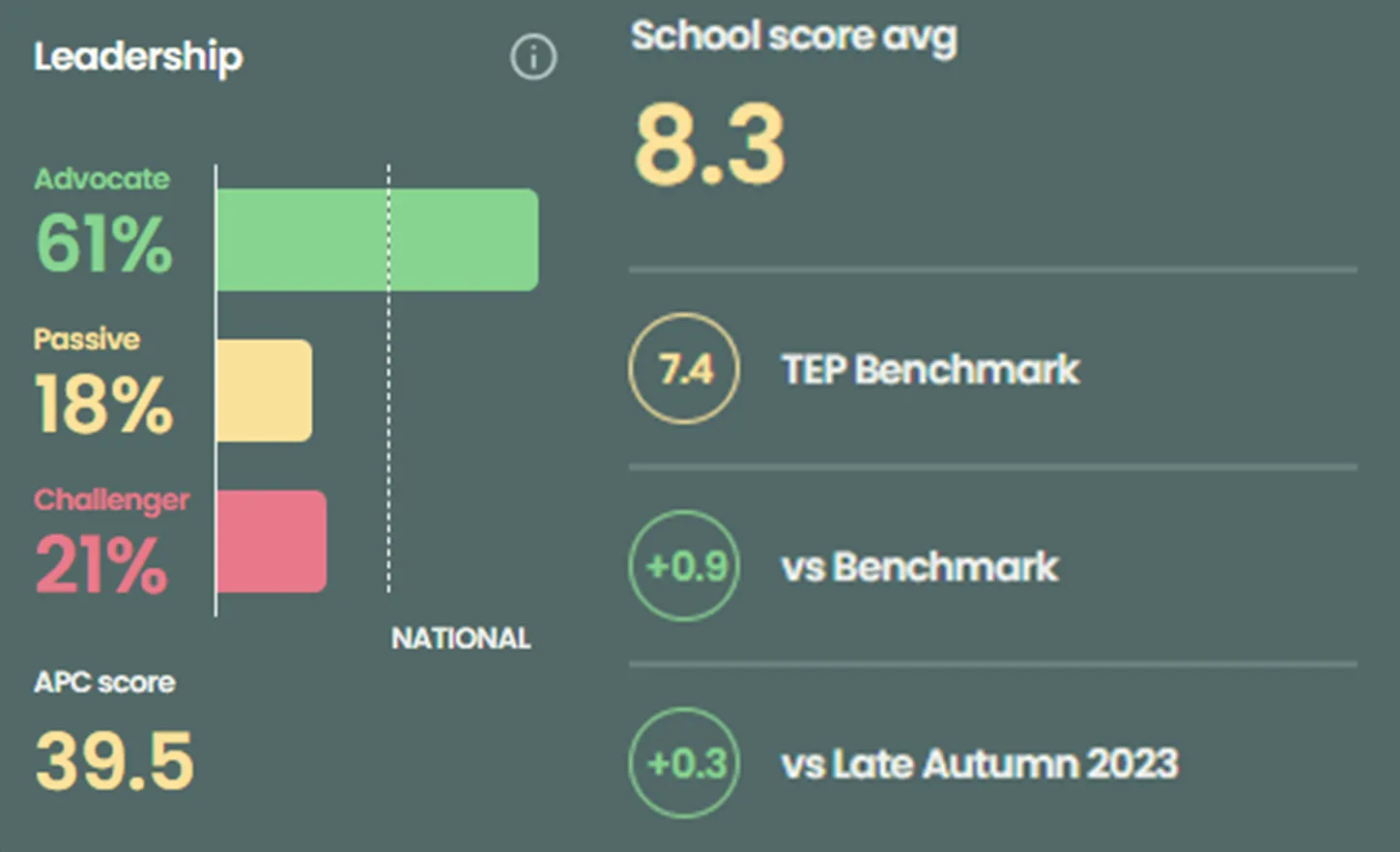
Dawn Wilson took over the headship at Hill Farm five years ago and introduced values-based education as a cornerstone of the school's ethos from her first month in post. Hill Farm is part of the Castle Phoenix Trust, aiming to provide the best learning and teaching environment across its schools.
Key takeaways:
- Values shape behaviour: At Hill Farm, the embedded values-based education steers children towards kindness and responsibility, fostering an inclusive environment where children feel they belong.
- Proactive behaviour management: Hill Farm promotes positivity through proactive strategies, integrating engaging lessons and high-quality teaching with strong relationships. Their reward system motivates students to exemplify positive behaviours.
- The importance of leadership: Dawn Wilson's leadership has developed a supportive and calm school community. The TEP data supports a satisfied staff body and she continues to make improvements further benefiting the members of the school.
Under Dawn’s leadership, Hill Farm Primary School has embarked on a transformative journey to foster positive behaviour management through an embedded values-based education approach. I was keen to meet with Dawn to discuss their above-benchmark scores for behaviour at the school, supported by their above-benchmark scores for their headline engagement and workload (see Figure 1).

This case study explores how Hill Farm has developed its unique ethos and leadership approach to create a compassionate and inclusive learning environment.
Values-Based Education
Central to Hill Farm's ethos is its commitment to values-based education, which permeates every aspect of school life. Hill Farm has been accredited by the Values-based Education (VbE) organisation and is a ‘Quality Mark School’.
Quality mark assessments consider six aspects of a school’s experience for pupils: Wellbeing, Ethical Leadership, Behaviour and Relationships, Teaching and Learning, Reflection, and Values into Action.

Hill Farm has five core values (see Figure 2) including "Live without Harm" and "Resourcefulness," which serve as guiding principles, shaping students' moral compass, and fostering empathy, responsibility, and ethical leadership, and exist under the acronym ‘LEARN’, and additionally align with the five British Values. ‘LEARN’ was created in collaboration with the leadership team, but Dawn also spoke to the students about their favourite values, ‘kindness’ was the most common answer so this was included within the ‘Altruism’ value.
Within each value there are four key actions, which are explicitly taught on a rolling basis. The students at Hill Farm can repeat what these actions are, what they need to do to show them and the linked British Value. Staff can, and do, remind students of these values throughout the school day.
Values are launched in weekly assemblies, which also aids in retrieval. At the time of our conversation, Hill Farm was on ‘R’ – ‘Resourcefulness’ which ties into the British Value of Individual Liberty, students explored freedom of choice. Each value has four actions – one of these is being courageous. Staff introduced this value through a story in the assembly, which also supports their reading focus. They went on to examine how the main character of a story demonstrated courage in the face of adversity. Dawn has embedded the five core values during her time as head, and attributes the high TEP scores for behaviour to the consistency in application of these values, supporting children to make good decisions and exemplify positive behaviour.
Implementation of TEP
Recognising the importance of staff morale in creating a positive learning environment, Hill Farm, along with the Castle Phoenix Trust, implemented TEP, and have completed three census windows to date. Dawn Wilson championed TEP within Hill Farm, emphasizing the need for transparency and accountability across the trust. Results consistently show that behaviour management at Hill Farm surpassed benchmarks, reflecting a commitment to fostering a positive school culture (see Table 1), which is also reflected in the consistently increasing(and above benchmark) leadership results (see Figure 3).
.webp)

Positive behavioural approach
At the heart of Hill Farm's behaviour management approach lies a proactive, values-driven strategy aimed at promoting positive behaviours and building strong working relationships. Staff (and the leadership team) prioritise CPD which develops and supports high-quality teaching and engaging lessons, recognising that engaging learning environments are key to reducing instances of challenging behaviour.
Where a teacher does feel they need more support with a student, the school employs a multi-faceted approach, either a member of SLT and the SENCO will be radioed to take the child out of the lesson or to Reset. Reset is set up for the students with the highest level of SEN need, where students can ‘reset’ themselves, through methods including personalised sensory circuits (created in conjunction with outside agencies).
The positive approach continues within the reward system, which is based on values points and tokens – the school awards over 4000 of these each week. This system not only reinforces positive behaviours but also fosters a culture of celebration and recognition.
Leadership influence
Dawn Wilson's leadership plays a pivotal role in shaping behaviour management practices at Hill Farm. Leading by example, she embodies the school's values and fosters consistency in messaging and actions.
By prioritising staff well-being, and involvement in decision-making processes, Dawn has developed a supportive and collaborative school culture. Through open communication and a commitment to addressing previously lower-scoring areas identified in TEP surveys, she empowers staff to contribute to the school's continuous improvement efforts.
Impact and future planning
Hill Farm's journey toward embedding and enacting a thorough values-based education for their students has yielded tangible results, reflected in their positive and above benchmark scores around satisfaction, inclusivity, and work-life balance(see Table 2). Dawn is currently co-creating a mission statement around staff wellbeing (including behaviour) with her team.
.webp)
“Our aim is for every child, regardless of circumstance or background to experience a childhood filled with happy memories of school and a love of learning that takes them into adulthood.”
(Hill Farm’s Website)
Moving forward, the school aims to further embed its values-based approach into all aspects of school life, fostering an inclusive and supportive environment where every student feels valued and respected. By continuing to prioritise staff well-being and collaboration, Hill Farm remains committed to developing responsible, compassionate citizens.
Conclusion
In summary, Hill Farm Primary School, led by Headteacher Dawn Wilson, has successfully promoted positive behaviour through their holistic values-based education.
By putting emphasis on core values such as kindness and respect, the school has created a welcoming environment where every student feels valued. This approach, reflected in above-benchmark scores in TEP surveys, further highlights the school's commitment to staff well-being and ongoing improvement. The TEP scores recorded at Hill Farm demonstrate how strong leadership can shape a supportive community and prepare students for success.
Dawn is happy to be contacted to discuss her approach further by email dawn.wilson@castlephoenixtrust.org.uk
Interested to find out how your institution matches up?
Get in touch with us today at hello@tep.uk to find out more.

.webp)
%20(1).webp)





.png)

